Why did the government turn off the internet in Cuba?
With such little information coming out of Cuba, our team took a look at what has been reported and what we know is happening on the island.


The US blockade has weakened Cuba's economy over the last five decades, leaving it extremely vulnerable to the economic shocks caused by the pandemic. The island has suffered from the lack of tourism of the course of the pandemic, and since they began to reopen just a few weeks ago, cases are skyrocketed.
Further sanctions implemented by the Trump administration make sending money through remittances more difficult, and pharmacies and hospitals have run out of basic supplies needed to treat covid-19 patients.
On 11 July, Cubans took to the streets in historic protests. Many of those who participated called for the removal of President Manuel Diaz-Canal, while others voiced frustrations with food and medical supply shortages and the US blockade, which makes obtaining those goods even more difficult.
Internet Shutdowns: Where did they happen and why?
One tool the Cuban government has used to stimmy the protest movement was to shut off the internet across parts of the island. After a historic number of protesters took to the streets on Sunday, some outlets reported “short, widespread, general internet outages.”
After thousands took to Cuba's streets to protest the government's handling of food shortages and price surges that were made worse by COVID-19, the government responded by cutting access to the internet. Service was restored on Wednesday, but outrage over the situation remains. pic.twitter.com/P3QHT7Qh08
— CBS News (@CBSNews) July 15, 2021
The government company, ETECSA, which provides internet, stated that the outages were caused by "technical issues," but many officials and activists believe it was intentional. Some experts who have looked into the outages say that signs point to it being an intentional shutdown, but the evidence is far from conclusive.
NetBlocks, an internet freedom advocacy organization, posted a report showing that their systems had confirmed a "partial disruption to social media and messaging platforms in Cuba from 12 July 2021."
⚠️Update: Real-time network data confirm social media and messaging platforms including Facebook and WhatsApp are again restricted in #Cuba on state-run internet provider ETECSA after brief period of restoration on day four; incident ongoing 📵#SOSCuba
— NetBlocks (@netblocks) July 15, 2021
📰https://t.co/7eGwPS1Mqf pic.twitter.com/HJSv7xCr1P
The organization reported that apps including Facebook, Instagram, WhatsApp, and "some Telegram servers are disrupted on government-owned ETECSA." The blocking of these cities was believed to have been done to "limit the flow of information from Cuba following widespread protests on Sunday."
Based on this information, the organization called on the government to "comply with international norms and internet governance frameworks and ensure reliable internet connectivity including at times of political unrest.
This is not the first time the regime has deployed this tactic. In November, the government powered down the internet in Havana after some isolated protests happened.
Cuban internet infrastructure
Cuba’s internet infrastructure is weak.
Telecommunications cables that run along the ocean floor are “responsible for carrying around 97 percent of the world’s communication traffic," according to The Next Web, a technology media outlet.
The U.S. blockade limited the cables the island could use to connect, as many were built or owned by American companies. Until 2013, Cuba was completely unconnected from the vast underwater cable system until “the country activated a $70 million, 1,600 kilometer (994 mile) pipeline to Venezuela.”
Why can’t they connect to more cables?
The economic embargo is part of the problem. While President Obama loosened the telecommunications restrictions, many US-based companies have not shown an interest in working in Cuba… with one major exception, Google.
Related stories
In 2019, the Cuban government and Google struck a deal to increase internet access across the country. The MoU signed stated that they had agreed to develop a direct connection between their internet networks available at no cost to users.
The embargo does not have all the blame for the faulty internet infrastructure. Additionally, authoritarian regimes do not have the best track record on internet freedom. Cuba monitors citizen internet use, and Next Web argued that a case could be made “that the country has deliberately rationed access in order to keep it out of the hands of the masses.”